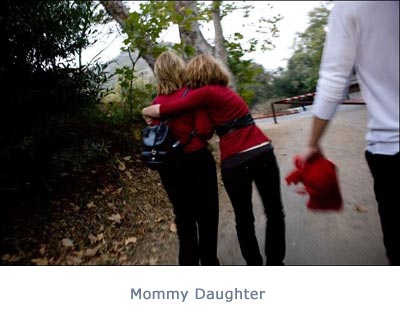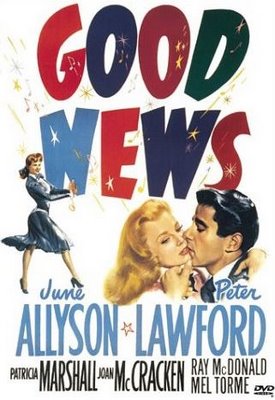The Coffee Talk Companion: "Lost in Transliteration."
The Coffee Talk Companion is an ongoing feature in which we dissect and discuss former Facts of Life star Lisa Whelchel's online journal entries.
So, Lisa leaves us for an unprecedented two weeks and then reappears on the scene with a turd of a post about how to be a good Bible mom. Or something. Folks, we're gonna give it a go with this one, but we're not promising any miracles. You'll have to wait for Chanukah for that. (Which begins this Saturday, incidentally. If you need our address for gifts, send us an email. Thanx!)
Oh, and to make it easier. We'll pepper our post with the Cauble holiday photos Lisa so sinisterly banishes to the bottom of her page.
Bible Study Book Sneak Peek
It’s (almost) finished! I just returned from a week holed away in a bunkhouse finally finishing “The Busy Mom’s Guide to Bible Study.” I don’t know what made me think this would be an easier book to write than it turned out to be. Maybe that means it will bless a lot of moms. I sure hope so. For this week’s journal entry, I thought I’d give you a sneak peek with three of the Bible study methods. There is a lot more interaction in the book but I’ll tell you more about it as the release date approaches.
What's a bunkhouse and why was it writing Lisa's book? Oh, fuck it. We're not even gonna start with grammar patrol today. We're too hungover—we were at a boozehouse last night.
Tools for Digging
Write it Down and Walk it Out
Kinesthetic learners are a lot of fun! My son, Tucker, like many people with ADHD, is a kinesthetic or tactile learner. This means he learns best by physically doing things. As his homeschool teacher, I’ve had to discover a variety of touchy/feely ways for creating hands-on learning experiences for this fun-loving boy of mine.
You know what's good for a child with ADHD? AN ACTUAL FUCKING SCHOOL WITH ACTUAL FUCKING STUDENTS AND TEACHERS. Where Tucker's ADHD can be nurtured by people trained to deal with such a getting-more-common-by-the-millisecond issue. Oh, and medication. That's good, too.
And speaking of tactile...

Often, kinesthetic learners are good at sports and process information best while moving rather than sitting around and thinking about it. (That would drive them absolutely bonkers and everyone else around them because they would probably be fidgeting the whole time they are attempting to sit still.)
This is getting scarier by the sentence. Should a woman who uses the word "bonkers" really be allowed to not only raise but educate three children, at least one of whom has ADHD? And should said woman really be allowed to be passing this information on to others? Is Judith Regan publishing this book?
If you are a tactile leaner then I bet you enjoy “getting your hands dirty” by jumping in and tackling a problem before reading the instructions or listening to advice. You might say you learn best by experience. You may have a shorter attention span and do better studying in short blocks of time. Sounds like you’re holding the perfect book in your hand for this learning style.
Some might also say you're "getting your hands dirty" by holding this book in your hand. Ho ho.
If, as an experiential learner, you want to “taste and see” that the Lord is good then have I got a great Bible study method for you. Like babies who have to put everything in their mouths to fully experience something, we are going to bite off a small chunk of scripture at a time and roll it around for awhile to give God’s Word plenty of time to be fully ingested.
Great. Now we're babies eating god McNuggets. This woman is fucking bonkers.

The first thing I want you to do is grab some flashcards. Just having something to hold in your hands is usually comforting to the tactile learner. Now, choose a passage or verse and write it out in longhand on your flashcard. Typically, kinesthetic learners have messy handwriting but penmanship will not be graded so don’t sweat it. Typing is probably a better choice for you in everyday situations but you won’t receive the full benefit of this Bible study method unless you actually write the whole verse out. Either, cursive or printing will do.
It's as if she thinks she's invented the wheel, isn't it? Truly astonishing. Ah, well. Here's what we put on our Bible flashcard. (It's Proverbs 3:35, in case you care, which you shouldn't.)
"The wise shall inherit glory: but shame shall be the promotion of fools."
Studies show that handwriting is not just a motor process; it is also a memory process. The same is true for walking. As an actress, I would often take my script and simply walk around the rehearsal hall reading my lines out loud. The combination of visual, auditory, and kinesthetic techniques shortened the time it took for me to memorize a new script each week. So…not only are you learning a new Bible study skill today but you may just end up hiding the Word in your heart as a bonus.
And that's where that helpful tip ends. It goes from the very clear "The first thing I want you to do is grab some flashcards" to maybe writing a Bible verse on the flashcard and then walking around with it or perhaps just practicing writing Bible verses on flashcards. We really can't tell. And we probably shouldn't be surprised, but here's a tip: if you're gonna give someone advice, it should probably make fucking sense.
Parallel Translations
OK. Just to note: usually we comment on Lisa's posts as we read them. We've found that if we read the whole thing first before commenting, it actually makes less sense than if we just take it bit by bit. (This is a specifically Whelchian phenomenon, and, if we were her agent, it's the one topic we'd allow her to write a book about.)
Sorry. The point here is that we read the entire next section just because we were searching for something, ANYTHING, to inspire us. It so didn't happen. All we can offer is that if you want to play a drinking game (and why wouldn't you?), take a sip anytime you see the word "Bible." Just make sure you have A LOT to drink. And about 37 Aleve handy.
Do you have a favorite Bible translation? As a young believer, I grew up reading from The King James Version, with all of its “thees” and “thous.” I was happy to discover the easier to read and understand paraphrase, The Living Bible, as a teenager. Today, I enjoy reading from a handful of translations, but my current favorite is the English Standard Version.
You may believe that all Bibles are the same, but that isn’t exactly the case. Some translations, like the ESV, NKJV, and NASB, are referred to as “essentially literal” translations. The easiest definition would be a “word-for-word” translation from the original languages. Similarly, are the “thought-for-thought” translations, these include the NIV, TNLT, and the Amplified Bible. These are a few examples of “dynamic equivalent” translations. Then there are the versions that aren’t really translations at all. They would be much better referred to as “paraphrases.” You may be familiar with some of these wonderful titles, The Message, The Living Bible, The Good News Bible.
Personally, I believe there is merit in keeping on hand, and using, a variety of different kinds of Bibles. I once spent a whole year reading the same chunk of Scripture out of a different Bible every day for a week at a time. I enjoyed beginning with a paraphrase to grasp the big picture and making my way to the King James Version with my Strong’s Lexicon handy.
Today, we are going to discover the benefits of reading the same verse from a variety of translations. This being the first month of our walking this journey of Bible study discovery together, I will provide the different translations. I would encourage you to gather a handful of Bibles before next month, when you will use this technique on your own. That may be as simple as grabbing your child’s Bible, borrowing your friend’s extra study Bible, or visiting BibleGateway.com, or a similar Bible resource website.
This approach is as simple as reading the same verse or passage from a handful of translations and noticing how different words and concepts become richer from different perspectives.
See, we really couldn't bear to break this one down section by section. And we finally know why. Besides that we're completely drunk again. It terrifies us when someone, especially a "teacher," talks at such length about having different translations of a book and that book not having been written by, say, Dante or Flaubert or Borges. Know what we mean?

Moving very quickly on...
Original Languages
Okay, let’s start with the basics. The Old Testament was originally written primarily in the Hebrew language because it is the history of the Children of Israel and that is the language they spoke. The New Testament was written primarily in the Koine Greek, or Greek-on-the-street, because it was the language of the day, very similar to what English is today. Getting His Word into the hands of everyday people would make the most sense for why God would choose common Greek as the Good News language. (There is also some Aramaic sprinkled throughout the Bible but that just confuses the issue so let’s agree to pretend we don’t know that.)
Have you ever gotten the feeling in your life that all of a sudden you're watching someone actually go crazy right before your eyes? No, we're not talking about her! We're talking about us, people! Sheesh. Like, what are we supposed to do when someone keeps mentioning "Good News" and isn't talking about the musical that made famous the Varsity Drag? SEE?

In the early 5th century the Bible was translated into Latin but it wasn’t until the 16th century, after the Protestant Reformation, that we began seeing the Bible translated into English. Okay, history lesson over. Let’s learn why this is important to us today.
OK, but first can we learn what the history lesson was?
As in any translation, whether from Hebrew to Greek, (The Septuagint or “LXX,”) or Greek to Latin, or Hebrew to English, something is always lost in the translation.
She's very sneaky here. She leaves out the one we're all wondering about: English to nonsense.
To complicate things even further, there are often multiple words in the original languages translated into only one English word. For instance, in the Psalms, David is always telling us to praise the Lord but there are a ton of different Hebrew words that are each and every one translated into our one English word “Praise.” It is actually quite sad because there is so much texture and color that becomes bland when we are limited to the confines of the English language, especially in this particular instance.
What's actually quite sad is that we're still here. Honestly. So let's take this time to say that we know this week's Companion isn't the best ever, but look at what we have to work with for goodness' sake! There are only so many times we can reiterate that the more Lisa tries to explain something, the less clear it becomes. The only bit of comfort we take is that she's not attempting to explain something we give a shit about. Like, if she were writing a book about why it's important to not only cut arts funding from actual schools where actual students are but replace it with Bible study curricula, then maybe we'd get antsy. But theoretically explaining flashcards and ADHD King James translations to moms dim enough to pick up her book with their dirty hands doesn't really move us enough to try to glean even a bit of sense from it all. It just makes us capital-everything BONKERS.
It is important that we know which Hebrew or Greek word the English word represents in order to determine its vibrant definition. Today we’re going to learn how to use Word study dictionaries, like Strong’s KJV, NAS Exhaustive, or NIV Concordances. These resources list the words used in the Bible with their Greek or Hebrew meaning and they are invaluable in helping us get back to the original heart of God when He first spoke the Word.
It is a lot easier than you would think to be able to do a little mini exegesis. Here are the simple pseudo-seminary steps. Read the passage and pick a key word to define, look that word up in one of the above mentioned concordances. Don’t forget these resources are also available online or in Bible software. Find the particular reference text you’re reading. There will be a Strong’s or GK number listed to the right of your verse. Go to the back of your concordance and you will find a dictionary. Go to that number and you will find the Hebrew or Greek word that was originally used and multiple definitions. Voila! (That’s French for “There you have it!”)
And...voila! It's over!
If you're still with us, give yourself a pat on the back for persevering. And then promise you'll never do it again. It's a beautiful day, and the holidays are just around the corner. You have no excuse for forcing yourself to read this. And, the worst part is, she threatens to give us more.
Lisa, if you're reading this, and we feel that it's safe to say there's a 78% chance you are, what we want for Chanukah from you is a detailed yet concise "Christmas with the Caubles" post. Oh, by the way, Leese, Chanukah is that holiday that's mentioned in that Hebraic Old Testament you keep kind of talking about. It's the very insignificant holiday that, just because it happens to fall on or around Christmas every year, has been bastardized into a major celebration of gift-giving, latkes and fire. It has something to do with Judah Maccabee and some temple. Or, at least that's what the Bible says. But, as we all know, the Bible's just another book of folktales. Like the Greek myths. Or Cooking with Paula Dean. The real reason for Chanukah is that after we killed Christ, we celebrated for eight days. When the booze ran out, we returned to our shtetls to think quietly about what we'd done. And then we had Purim and the real party started.
Shalom! (That's Hebrew for "See ya.")

So, Lisa leaves us for an unprecedented two weeks and then reappears on the scene with a turd of a post about how to be a good Bible mom. Or something. Folks, we're gonna give it a go with this one, but we're not promising any miracles. You'll have to wait for Chanukah for that. (Which begins this Saturday, incidentally. If you need our address for gifts, send us an email. Thanx!)
Oh, and to make it easier. We'll pepper our post with the Cauble holiday photos Lisa so sinisterly banishes to the bottom of her page.
Bible Study Book Sneak Peek
It’s (almost) finished! I just returned from a week holed away in a bunkhouse finally finishing “The Busy Mom’s Guide to Bible Study.” I don’t know what made me think this would be an easier book to write than it turned out to be. Maybe that means it will bless a lot of moms. I sure hope so. For this week’s journal entry, I thought I’d give you a sneak peek with three of the Bible study methods. There is a lot more interaction in the book but I’ll tell you more about it as the release date approaches.
What's a bunkhouse and why was it writing Lisa's book? Oh, fuck it. We're not even gonna start with grammar patrol today. We're too hungover—we were at a boozehouse last night.
Tools for Digging
Write it Down and Walk it Out
Kinesthetic learners are a lot of fun! My son, Tucker, like many people with ADHD, is a kinesthetic or tactile learner. This means he learns best by physically doing things. As his homeschool teacher, I’ve had to discover a variety of touchy/feely ways for creating hands-on learning experiences for this fun-loving boy of mine.
You know what's good for a child with ADHD? AN ACTUAL FUCKING SCHOOL WITH ACTUAL FUCKING STUDENTS AND TEACHERS. Where Tucker's ADHD can be nurtured by people trained to deal with such a getting-more-common-by-the-millisecond issue. Oh, and medication. That's good, too.
And speaking of tactile...

Often, kinesthetic learners are good at sports and process information best while moving rather than sitting around and thinking about it. (That would drive them absolutely bonkers and everyone else around them because they would probably be fidgeting the whole time they are attempting to sit still.)
This is getting scarier by the sentence. Should a woman who uses the word "bonkers" really be allowed to not only raise but educate three children, at least one of whom has ADHD? And should said woman really be allowed to be passing this information on to others? Is Judith Regan publishing this book?
If you are a tactile leaner then I bet you enjoy “getting your hands dirty” by jumping in and tackling a problem before reading the instructions or listening to advice. You might say you learn best by experience. You may have a shorter attention span and do better studying in short blocks of time. Sounds like you’re holding the perfect book in your hand for this learning style.
Some might also say you're "getting your hands dirty" by holding this book in your hand. Ho ho.
If, as an experiential learner, you want to “taste and see” that the Lord is good then have I got a great Bible study method for you. Like babies who have to put everything in their mouths to fully experience something, we are going to bite off a small chunk of scripture at a time and roll it around for awhile to give God’s Word plenty of time to be fully ingested.
Great. Now we're babies eating god McNuggets. This woman is fucking bonkers.

The first thing I want you to do is grab some flashcards. Just having something to hold in your hands is usually comforting to the tactile learner. Now, choose a passage or verse and write it out in longhand on your flashcard. Typically, kinesthetic learners have messy handwriting but penmanship will not be graded so don’t sweat it. Typing is probably a better choice for you in everyday situations but you won’t receive the full benefit of this Bible study method unless you actually write the whole verse out. Either, cursive or printing will do.
It's as if she thinks she's invented the wheel, isn't it? Truly astonishing. Ah, well. Here's what we put on our Bible flashcard. (It's Proverbs 3:35, in case you care, which you shouldn't.)
"The wise shall inherit glory: but shame shall be the promotion of fools."
Studies show that handwriting is not just a motor process; it is also a memory process. The same is true for walking. As an actress, I would often take my script and simply walk around the rehearsal hall reading my lines out loud. The combination of visual, auditory, and kinesthetic techniques shortened the time it took for me to memorize a new script each week. So…not only are you learning a new Bible study skill today but you may just end up hiding the Word in your heart as a bonus.
And that's where that helpful tip ends. It goes from the very clear "The first thing I want you to do is grab some flashcards" to maybe writing a Bible verse on the flashcard and then walking around with it or perhaps just practicing writing Bible verses on flashcards. We really can't tell. And we probably shouldn't be surprised, but here's a tip: if you're gonna give someone advice, it should probably make fucking sense.
Parallel Translations
OK. Just to note: usually we comment on Lisa's posts as we read them. We've found that if we read the whole thing first before commenting, it actually makes less sense than if we just take it bit by bit. (This is a specifically Whelchian phenomenon, and, if we were her agent, it's the one topic we'd allow her to write a book about.)
Sorry. The point here is that we read the entire next section just because we were searching for something, ANYTHING, to inspire us. It so didn't happen. All we can offer is that if you want to play a drinking game (and why wouldn't you?), take a sip anytime you see the word "Bible." Just make sure you have A LOT to drink. And about 37 Aleve handy.
Do you have a favorite Bible translation? As a young believer, I grew up reading from The King James Version, with all of its “thees” and “thous.” I was happy to discover the easier to read and understand paraphrase, The Living Bible, as a teenager. Today, I enjoy reading from a handful of translations, but my current favorite is the English Standard Version.
You may believe that all Bibles are the same, but that isn’t exactly the case. Some translations, like the ESV, NKJV, and NASB, are referred to as “essentially literal” translations. The easiest definition would be a “word-for-word” translation from the original languages. Similarly, are the “thought-for-thought” translations, these include the NIV, TNLT, and the Amplified Bible. These are a few examples of “dynamic equivalent” translations. Then there are the versions that aren’t really translations at all. They would be much better referred to as “paraphrases.” You may be familiar with some of these wonderful titles, The Message, The Living Bible, The Good News Bible.
Personally, I believe there is merit in keeping on hand, and using, a variety of different kinds of Bibles. I once spent a whole year reading the same chunk of Scripture out of a different Bible every day for a week at a time. I enjoyed beginning with a paraphrase to grasp the big picture and making my way to the King James Version with my Strong’s Lexicon handy.
Today, we are going to discover the benefits of reading the same verse from a variety of translations. This being the first month of our walking this journey of Bible study discovery together, I will provide the different translations. I would encourage you to gather a handful of Bibles before next month, when you will use this technique on your own. That may be as simple as grabbing your child’s Bible, borrowing your friend’s extra study Bible, or visiting BibleGateway.com, or a similar Bible resource website.
This approach is as simple as reading the same verse or passage from a handful of translations and noticing how different words and concepts become richer from different perspectives.
See, we really couldn't bear to break this one down section by section. And we finally know why. Besides that we're completely drunk again. It terrifies us when someone, especially a "teacher," talks at such length about having different translations of a book and that book not having been written by, say, Dante or Flaubert or Borges. Know what we mean?

Moving very quickly on...
Original Languages
Okay, let’s start with the basics. The Old Testament was originally written primarily in the Hebrew language because it is the history of the Children of Israel and that is the language they spoke. The New Testament was written primarily in the Koine Greek, or Greek-on-the-street, because it was the language of the day, very similar to what English is today. Getting His Word into the hands of everyday people would make the most sense for why God would choose common Greek as the Good News language. (There is also some Aramaic sprinkled throughout the Bible but that just confuses the issue so let’s agree to pretend we don’t know that.)
Have you ever gotten the feeling in your life that all of a sudden you're watching someone actually go crazy right before your eyes? No, we're not talking about her! We're talking about us, people! Sheesh. Like, what are we supposed to do when someone keeps mentioning "Good News" and isn't talking about the musical that made famous the Varsity Drag? SEE?

In the early 5th century the Bible was translated into Latin but it wasn’t until the 16th century, after the Protestant Reformation, that we began seeing the Bible translated into English. Okay, history lesson over. Let’s learn why this is important to us today.
OK, but first can we learn what the history lesson was?
As in any translation, whether from Hebrew to Greek, (The Septuagint or “LXX,”) or Greek to Latin, or Hebrew to English, something is always lost in the translation.
She's very sneaky here. She leaves out the one we're all wondering about: English to nonsense.
To complicate things even further, there are often multiple words in the original languages translated into only one English word. For instance, in the Psalms, David is always telling us to praise the Lord but there are a ton of different Hebrew words that are each and every one translated into our one English word “Praise.” It is actually quite sad because there is so much texture and color that becomes bland when we are limited to the confines of the English language, especially in this particular instance.
What's actually quite sad is that we're still here. Honestly. So let's take this time to say that we know this week's Companion isn't the best ever, but look at what we have to work with for goodness' sake! There are only so many times we can reiterate that the more Lisa tries to explain something, the less clear it becomes. The only bit of comfort we take is that she's not attempting to explain something we give a shit about. Like, if she were writing a book about why it's important to not only cut arts funding from actual schools where actual students are but replace it with Bible study curricula, then maybe we'd get antsy. But theoretically explaining flashcards and ADHD King James translations to moms dim enough to pick up her book with their dirty hands doesn't really move us enough to try to glean even a bit of sense from it all. It just makes us capital-everything BONKERS.
It is important that we know which Hebrew or Greek word the English word represents in order to determine its vibrant definition. Today we’re going to learn how to use Word study dictionaries, like Strong’s KJV, NAS Exhaustive, or NIV Concordances. These resources list the words used in the Bible with their Greek or Hebrew meaning and they are invaluable in helping us get back to the original heart of God when He first spoke the Word.
It is a lot easier than you would think to be able to do a little mini exegesis. Here are the simple pseudo-seminary steps. Read the passage and pick a key word to define, look that word up in one of the above mentioned concordances. Don’t forget these resources are also available online or in Bible software. Find the particular reference text you’re reading. There will be a Strong’s or GK number listed to the right of your verse. Go to the back of your concordance and you will find a dictionary. Go to that number and you will find the Hebrew or Greek word that was originally used and multiple definitions. Voila! (That’s French for “There you have it!”)
And...voila! It's over!
If you're still with us, give yourself a pat on the back for persevering. And then promise you'll never do it again. It's a beautiful day, and the holidays are just around the corner. You have no excuse for forcing yourself to read this. And, the worst part is, she threatens to give us more.
Lisa, if you're reading this, and we feel that it's safe to say there's a 78% chance you are, what we want for Chanukah from you is a detailed yet concise "Christmas with the Caubles" post. Oh, by the way, Leese, Chanukah is that holiday that's mentioned in that Hebraic Old Testament you keep kind of talking about. It's the very insignificant holiday that, just because it happens to fall on or around Christmas every year, has been bastardized into a major celebration of gift-giving, latkes and fire. It has something to do with Judah Maccabee and some temple. Or, at least that's what the Bible says. But, as we all know, the Bible's just another book of folktales. Like the Greek myths. Or Cooking with Paula Dean. The real reason for Chanukah is that after we killed Christ, we celebrated for eight days. When the booze ran out, we returned to our shtetls to think quietly about what we'd done. And then we had Purim and the real party started.
Shalom! (That's Hebrew for "See ya.")


10 Comments:
(There is also some Aramaic sprinkled throughout the Bible but that just confuses the issue so let’s agree to pretend we don’t know that.)
I think the foundation of her beliefs can be summed up in that one aside.
Two really unhot pictures of Daddy this week. I'm disappointed.
Okay, a couple of questions:
a) Steve, 1983 called. They want their glasses back.
and
2) Why is it in the girls' family photo, no one is grabbing Lisa's boob? Lucky Tucker.
I was dying to see what you would make of this entry.
You know, I feel like saying to Lisa that there truly aren't that many ways to interpret the Bible. If any book is at risk of being over-interpreted, it has to be that one. Perhaps her time would be better spent reading another book for once. One that actually has an author.
All I want for Christmas is for Lisa to become an atheist.
Thank God (NKJV if you please) for this blog. I heard about Lisa's webiste a year or so ago, stopped by out of curiosity and have been hooked ever since. Then I found you. I thought I was the only one obsessed with her obsessions, but no, there are enough of us to start a Lisa Study Group! YAY
um i like the fact she uses random french words after things like Blair did just to be snotty. hahahaha and lisa says she is COMPLETELY different from her character. right, Lisa, right.
Blair: It's a fit de compli(sp?) (a sure thing)
Tootie: It's a sure thing if you plan on going with his mother.
hahaha
I just don't get it. Where's the humour in all this? You go on forever about how stupid this woman is, but you're just being mean. So you dissect somebody's blog? Ha ha. Anybody could just take somebody's words and point a finger saying "look how stupid this fucking cow is", but that's just not funny. What you got here is a blog without substance.
Maybe this just shows that sense of humour requires some intelligence and either one of us hasn' got the required amount.
Wow, I was looking for some help and information and found your site to be very.....catty and condescending and a bit cruel. I don't know who this is, but I hope you can work out whatever issues you're having and come out happier than you seem in this blog. Good luck and may God bless you...I really do mean that.
Maysa
Anon--You were looking for help and information in a blog???
Actually, I've always found your writing to be hilarious, NB. I haven't checked in here for a while, since it seems that Ms. Whelchel has given up Coffee Time. Alas.
Honestly, Fundies irritate me so much that I absolutley love any attempt to take them down a peg. Especially since the passing of Prop 8.
Hope you are well, NB.
Post a Comment
<< Home